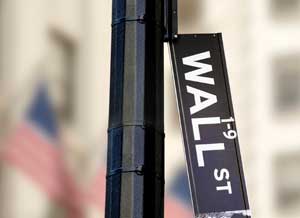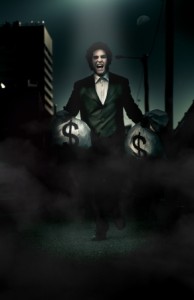Seems like every time I turn around there’s yet another scam artist on Wall Street ripping us off! Everywhere I look, some financial whiz kid is making a buck for himself out of the hard-earned dollars of everybody else!
But I dunno – is it really that bad? Maybe I’m exaggerating?”

So I decided to check it out and track the scandals of banks and Wall Street for just one month. I picked August (August, 2013), because, heck, it’s summertime and things should be pretty slow on the scams, scandals and shenanigans front, right? I mean, aren’t all those guys off in their multi-zillion dollar summer homes in the Hamptons or the Caribbean during August? Kinda like Congress where nothing at all happens when they go on recess?

Turns out the answer is yes and no. Yes, they were off vacationing, but no, that didn’t slow them down. In this should-be-sleepy month of August, I found dozens of reports and articles that made me cringe, cry, gnash my teeth and spit!
Here are some of the month’s lowlights:
#1: When It Sounds Too Good to Be True, It Is!
SAC Capital Advisors is accused of running a corrupt hedge fund. Evidence of insider trading is substantive, though SAC claims that it was “hard work and know-how” that created the firm’s 30% annual returns over the past couple of decades. The indictments against the firm say otherwise.
But oddly, Steven Cohen, hands-on manager and founder of the firm, isn’t named in the indictments. Gosh and golly, it turns out he “doesn’t read his emails” so isn’t responsible. In fact, this month Cohen threw a lavish party at his ten-bedroom, 9,000-square-foot home in the East Hamptons while those of us without insider information fired up burgers on the grill.
#2: But I’m Still Fabulous!
“Fabulous Fab” Tourre is found guilty of six violations of securities law and faces fines and a possible ban from the industry by the SEC. (Possible ban? Just possible?) Fab mislead investors in a mortgage-backed securities deal that netted Goldman Sachs $1 billion just as the housing bubble collapsed because he and others figured it would collapse. To do this, he designed a financial product that was designed to fail that he sold to other investors. By the way, Mr. Fabulous is now pursuing a doctorate of economics, presumably so he can teach future generations how money really works in this country!
#3: All in the Family:
 The FBI unseals a 24-count indictment against a New York investment manager and his brother-in-law accusing them of operating a $96 million Ponzi scheme to fund a money-losing Long Island resort. Investor funds were also used for credit card bills, luxury cars and down payments on lavish homes for the two scammers. The duo had raised about $118 million from investors – and misappropriated $96 million of it. The Long Island fire department may have invested (and lost!) $600,000. Wonder how those firefighters will respond if one of the luxury homes they unintentionally funded catches fire. Maybe bring wienies to the roast?
The FBI unseals a 24-count indictment against a New York investment manager and his brother-in-law accusing them of operating a $96 million Ponzi scheme to fund a money-losing Long Island resort. Investor funds were also used for credit card bills, luxury cars and down payments on lavish homes for the two scammers. The duo had raised about $118 million from investors – and misappropriated $96 million of it. The Long Island fire department may have invested (and lost!) $600,000. Wonder how those firefighters will respond if one of the luxury homes they unintentionally funded catches fire. Maybe bring wienies to the roast?
#4: Who Moved the Dial?
This month, U.S investigators uncover evidence that Wall Street banks reaped millions of dollars in trading profits by manipulating a benchmark for interest rate derivatives (ISDAfix). Though more obscure than indexes like LIBOR (another index Wall Street is accused of manipulating for decades), this index affects more people because pension funds like CalPers use it to hedge portfolio risks.
Banks being investigated include the usual suspects: BofA, Credit Suisse, JP Morgan, Morgan Stanley, et al. By the way, ICAP, the company that handled the intricate trading internationally to make sure the ISDAfix was manipulated, profited handsomely. In fact, their traders were reported to make $7 million annually, some making $100M to $120M at the peak. How’s that CalPers pension of yours looking now?
#5: Hee Hee Hee! Can’t Touch Me!
Federal investigators finally interview a health-care aide to Senator Charles Grassley (R-Iowa) regarding a health-care policy decision that was leaked to Wall Street traders before it was made public. The policy restored billions of dollars of cuts to private Medicare insurance plans. This little leak was uncovered due to the extraordinary spike in health insurance stocks right before the decision was announced.
Another aide was not interviewed about the leak because of a “constitutional privilege” that protects Congress and their staff from certain “civil and criminal lawsuits.” It protects all former lawmakers and their aides for actions during their time in congress. Mark Hayes, the former Grassley staffer turned lobbyist who tipped off the consulting firm who tipped off the traders, is connected to both aides in question. Moral of the story? If you don’t want to get prosecuted, do all your dirty work while working for Congress.
Tell Banks and Wall Street to Go Take a Hike!
Tired of seeing the Wall Street fat cats line their pockets at your expense? Discover how you, too, can opt out of a system where the odds are clearly stacked against the little guys and gals like us! Request your FREE Analysis and fire your banker, bypass Wall Street and take back control of your own financial future.
REQUEST YOUR
FREE ANALYSIS!
#6 Pretty Penny Stocks
The Financial Industry Regulatory Agency fines Oppenheimer & Company $1.4 million for selling a billion shares of 20 different penny stocks that were unregistered. Between 2008 and 2010, certain customers deposited huge blocks of penny stocks right after opening their Oppenheimer accounts, then liquidated them and transferred the proceeds out of the accounts. Oppenheimer failed to notice the red flags (Really?) and traded the stocks without verifying that they were registered. The company says that it has now tightened its policies and “is happy to put the matter behind it.” I’m sure the investors who bought those unregistered stocks would be happy to put the matter in Oppenheimer’s behind as well.
#7 Pretty Penny Stocks 2.0
Federal investigators uncover a sophisticated international penny stock scam that sold cheap stocks for companies that barely existed or did not exist at all, netting its organizers an estimated $140 million. Running for half a decade and defrauding investors in at least 35 countries, the scammers created a series of shell companies, wrote phony press releases, impersonated IRS officers and used multiples aliases when contacting investors. One of the 9 who was charged described the scheme as “Easy money.” He also told an undercover agent that “hitting the Americans would be like taking money from a baby.”
The alleged mastermind of the scheme (and principal of Blackout Media Corp.), Sandy Winick, was recorded while joking that he could continue operating under false names and shell corporations even if he was banned for life by the SEC. Mr. Winick remains at large.
#8 Your TARP Money in Action!
TARP funds were given to bankers so they could keep supporting real estate markets and contributing to the economy. Darryl Woods, chairman of Mainstreet Bank in Columbia, MO, did just that by buying himself a luxury condo in Florida with the money! Mr. Woods pleaded guilty in August to flat-out lying to regulators and funneling $381,000 of bailout money into his personal account. He will be barred from the banking industry and has to pay $100,000 in fines along with making restitution. He will also serve up to 1 year in federal prison – which is less time than he’s spent in his taxpayer-funded Florida hideaway. As one article put it: “Consider it a second home loan. You know, the kind that’s infinitely tougher for the average taxpayer to get thanks to folks like Woods.”
#9 Those Little Black Boxes
For over a year, the FBI has been concerned about suspicious trading activity that kept happening right before sensitive economic data is officially released. The problem is reported to be the government’s “black boxes” which were specifically designed (but apparently not well designed) to avoid the possibility of leaks. Media firms who report on this economic data connect to these black boxes. Then, in theory, the “trap door” opens and they’re all supposed to get the information at the exact same time. In theory.
But it turns out there’s all sorts of ways to scam the system, including through wireless devices or phone lines – which the FBI detailed in a report in May 2013. The report says that these concealed IT devices “might still be in use” in lock up rooms across the government, and it concludes that this possibility “should be made known to the proper personnel.” Ya think?!?
#10 Wall Street Wins Again!

Detroit is in bankruptcy court this month and the City is suggesting that pension funds get cut by 90%, perhaps ignoring the fact that many of these pensioners do not get Social Security and their pensions are not federally insured. But big banks, namely UBS and Bank of America, will take a hit too, probably at about 25%. Poor banks. Oh, wait! These are the banks that set up the “interest swap” deals that helped put Detroit under. Ending up on the wrong side of the “swap,” the City paid these banks $50 million per year and pledged $11 million per month in casino revenues as collateral – money that could have offset Detroit’s pension obligations. Now, the bankruptcy court will likely award UBS and BofA $250 million and they will get paid before any other creditors!

Regulators are aware that inadequate protections in these swap deals practically invite banks to exploit cities and municipalities. But nothing’s been done about it yet because… Okay, I can think of no possible explanation for why nothing’s been done about it!
#11 It’s Worth How Much?!
Brian Williamson, a fund manager for Oppenheimer Holdings LLC, is been charged with making “material false and misleading statements and omissions to investors and potential investors concerning the valuation of his fund.” In 2009, Williamson’s inflated valuations made the fund appear as though its internal rate of return had jumped from 3.8% to 38.3% within one quarter. Mr. Williamson’s lawyers wrote: “We’re are deeply disappointed with the SEC’s decision to bring an enforcement action in this matter.” I’m just guessing that the investors who lost their shirts on this scam were more than “deeply disappointed!”
#12 Old Crimes, New Settlement
CitiGroup’s $730 million settlement with investors is approved by the courts in August. The lawsuit covers four dozen bond and preferred stock offerings in 2006 – 2008. It claimed that CitiGroup mislead investors about its risk exposure to securities backed by mortgages, misrepresented the credit quality of loans in the package and understated loss reserves. A CitiGroup spokesperson said that Citi had “done nothing wrong” but settled to avoid prolonging litigation and “the company is pleased to put the matter behind it.” Help me out here: So misleading, misrepresenting and understating is not doing anything wrong?
#13 Old Crimes, New Charges
Though Wall Street bankers are fond of saying they’d like to put the issues of the international financial crisis in 2008 “behind us,” it ain’t over yet. Eric Holder announced that the Justice Department will be revealing new cases against several large financial institutions for their part in the economic meltdown. Unfortunately, Columbia law professor John Coffee thinks that the 5-year statute of limitations on certain white collar crimes may make prosecution difficult. Oh goody! So many of the firms and people responsible for the meltdown will still be around to do it again!
#14 Old Crimes, New Lawsuit
HSBC Holdings plc estimates that it might be paying up to $1.6 billion for “mis-selling” its mortgage-backed bonds between 2005 and 2008 during the residential real estate bubble. A Federal Housing Finance Authority (FHFA) lawsuit claims that HSBC (along with Swiss Bank USB, Citigroup, General Electric, etc.) offered the bonds using “mis-statements and omissions” which ultimately caused hundreds of millions of dollars in damages to Fannie Mae and Freddie Mac. The article didn’t specify, but I’m sure that for $1.6 billion, HSBC will be “pleased to have this behind it” and “admits to no wrongdoing.”
Bypass Banks and Wall Street… and Grow Your Wealth Safely and Predictably Every Year
Join the hundreds of thousands of Bank On Yourself revolutionaries who’ve taken back control of their money and finances. Request your FREE Analysis and find out how big your nest-egg could grow – guaranteed – when you add the Bank On Yourself method to your financial plan.REQUEST YOUR
FREE ANALYSIS!
#15 You Done Wrong!
Here’s a novel idea: How about making some of these scammers and schemers admit that they have done something wrong? That’s what SEC Chairman Mary Jo White thinks should happen. Back in May, hedge-fund manager Philip Falcone and his fund Harbinger thought that they had a settlement for two civil lawsuits: one that claimed Falcone had taken out a $113 million personal loan from the fund (while investors were prevented from withdrawals) and another that claimed he had manipulated the bond prices of MAAX Holdings, Inc. In that deal, Harbinger would have paid $18 million and Falcone would be banned from trading for 2 years, but no one had to admit wrongdoing.
Surprise! The SEC rejected that settlement. The new deal requires more than $18 million, Falcone to be banned for 5 years, and an admission of wrongdoing! But don’t feel too bad for him. Falcone is still able to own and control Harbinger and retain his position of CEO and Chairman of the Board.
Would that be allowed in any other industry?!?”
#16 Big Win for JP Morgan!
JP Morgan is on a pace to beat out Bank of America as the lender with the biggest legal problems! What an honor! A growing number of lawsuits and investigations (ranging from bribery allegations in China to the London Whale trading fiasco to irregularities in certain mortgage-backed securities transactions) might force JP Morgan to realize an additional $6.8 billion in legal losses above its existing reserves. The next few items detail how JP Morgan got there:
#17 Beaching the Whale

Early last year, the WSJ reported that a JP Morgan trader had become known as the “London Whale” because his group had accumulated such huge derivative positions. JP Morgan dismissed concerns about the group’s bets as “overblown.” But over the months that followed, investigators determined that the group had intentionally mis-valued their positions and the “understated” losses were actually a whopping $6.2 billion. (Even so, the bank made a profit of $21.3 billion last year, so no tears shed.)

In August, the Justice Department reached an agreement with the London Whale himself which allows him to avoid prosecution, apparently in exchange for evidence against his two co-conspirators. It’s not clear whether the justice Department will bring charges against other senior managers at JP Morgan, but the SEC is pressing for a settlement with the bank in which it “admits to some wrongdoing.” Yep, about $6.2 billion worth of wrongdoing.
#18 That’s Not a Tiger in Your Tank – It’s JP Morgan!
In July, JP Morgan agreed to a settlement of $410 million with the Federal Energy Regulatory Commission regarding allegations that the bank manipulated markets in California and the Midwest. The bank did not admit to wrongdoing in the settlement. (Hmmm. So market manipulation is also not considered “wrongdoing?”) But in August, the Justice Department decided to examine JP Morgan’s recent energy transactions, adding that investigation to at least 6 others that are currently active regarding JP Morgan.
#19 We’re Prosecuting But Are We Preventing?
An op-ed piece by Stanford’s Anat R. Admati says that though it’s nearly 5 years after the global financial crisis touched off by Lehman Brothers’ bankruptcy, regulators still haven’t implemented any changes that would prevent the exact same scenario from happening again.
Had enough? Me too. Check out how Bank On Yourself revolutionaries have kept themselves out of the cesspool of Wall Street, banks and bankers!



Pam,
Powerful stuff and much appreciated!
BTW did a little homework into FDIC.
Seems there is some $10 trillion in bank savings + or – and
the FDIC has a whopping $25 billion to cover all those accounts up to $250K
That is something like 375:1 debt to asset ratio.
Imagine if an insurance company operated on that spread?
Continue to be a blessing.
Mike FitzPatrick
What beats all of the thieves on Wall Street? Congress!